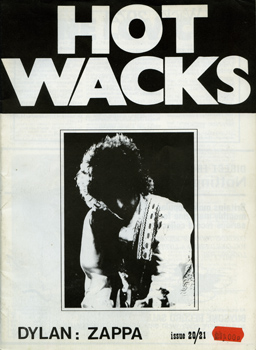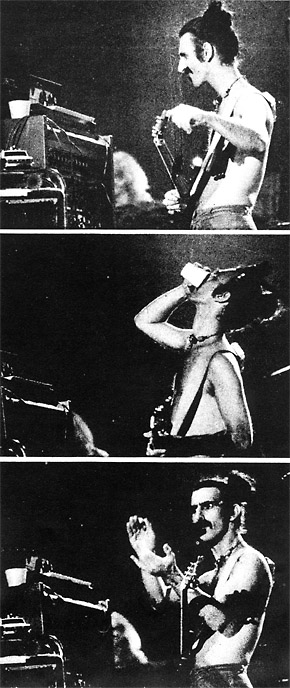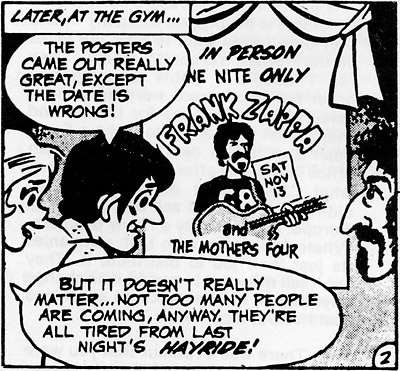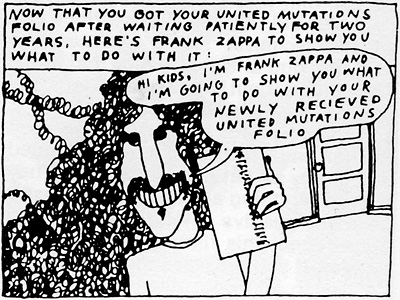Zappa, Hot Wacks 20/21
Zappa
Hot Wacks 20/21, 1980
Published from:
16 Almondbank Terrace, Edinburgh EH11 1SS.
Published by Wackadoo Productions, Inc
"Hello, this is Frank Zappa ... You're going to die."
"If we are involved in things that occur on the road with groupies and assorted weird events of a sexual nature it's better that we tell about it ourselves in a musical format and do it with the people it occured to than have somebody else say, 'And then in 1971, one time when they were out on the road at the Mudshark Hotel ...' you know. It's better to do it that way, but, unfortunately, some people have a peculiar attitude towards things of a glandular nature connected with things of a musical nature. They say, 'Well, music is so high, it's here and glands are away down there. You know, we can't really get them together'. And then they're hypocritical and then they turn around and the group that comes in and doesn't sing overtly about those things but couches their language a little bit and does it with a little choreography. They think that's great and that's real rock 'n' roll, and I maintain there's no difference we were just honest enough to go out there and say, 'this is this, that's that and here you are and respond to it'. And the response to it was, 'I'm hip but, of course, I'm offended".
ZAPPA
Sometimes it seems Frank Zappa is never happy except when he's grumbling. Fortunately, he's an articulate grumbler and usually has something sensible to gripe about, be it record companies or film distributors. Chris John, who went down to London to see Frank's "Baby Snakes" film and talk to him, gave him tea and sympathy.
In the last 12 months, since signing with CBS, there seems to have been a sudden surge in creativity ...
Well, maybe it looks like a surge of creativity but the work has been going on for a long time. I've been working on the film for 2 years, and it's no problem for me to do at least 2 albums a year ... and that's basically what I did. The "Sheik Yerbouti" album was the early part of the year and "Joe's Garage" was supposed to be a single 3-record set but I changed it into 2 releases because the cost of a 3-record package might be hard on people the way the world is today. So it looks like a lot of stuff but that's just an average year's work.
Because we were concerned for you over here ...
Were you afraid I'd burn out this week or something?
No, it was really all the hassles with Warner Brothers.
Well, the thing is that Warner Brothers never really were too efficient at bringing the attention of the public to the work I was doing. They just weren't enthusiastic with me as an artist and aside from that they breached the contract and that engendered the law suit. There were a couple of years before I could get another record contract someplace else. I mean they tried to tie me up and ruin my business ... and continued to try and ruin my business by releasing those albums after I'd already signed with CBS and also by packaging those albums in the most disgusting jackets that anyone had ever been subjected to. This did a great disservice to the music that was in there because there was some great music in those last Warners' albums. (Here Frank is referring to "Studio Tan", "Sleep Dirt" and "Orchestral Favorites". You may also recall that Frank used to tour with a stage backdrop of the Warners' logo complete with the legend "Warner Brothers Sucks" -Ed).
But you'll have your revenge.
Well, eventually. It has to go to court.
In performance you don't leave the company with a very good name.
They don't have a very good name as far as I'm concerned. Just because they have Bugs Bunny on their stationery doesn't mean they're good guys.
When I heard that "Baby Snakes" was going to run 2 hours 43 minutes I thought: "What have I let myself in for?" But having sat through every minute of it, my concentration did not relax for one second ...
You can't allow it to, otherwise you get into a lot of trouble.
Apart from what some critics have been saying – and I gather these guys must have had brief previews of it – they weren't at all complimentary. But the thing does seem to flow, despite what they say.
There's no way they could have seen it. This is the first time anyone in the country has seen it.
It's very well edited.
I was the supervising editor, and actually physically did the first stages of the editing and then I hired an assistant. He did all the manual work after I'd told him where I wanted the cuts to be. I also did the colour corrections and all the technical finish work on the film, the dub and the rest of that stuff. This thing about the reviews is ... the film is showing in New York right now ... and the only film people to have seen the film and write about it have all hated it and they all felt it was too long. They hated everything about it. There hasn't been one positive review in the United States about this film. But, you know, f-k 'em. If you'll excuse the expression. I'd like to add one other thing. What they say about it and what the audience in New York does when they get into the theatre are two different things. I've watched it on three different occasions in New York City with the kids when they're watching the movie. It's just like being at the concert again because they're all yelling and screaming and they're really having a good time with it. It shows a side of what I do and a view of the musicians in the band that nobody has ever seen before. One of the strangest things happened the first time the picture was shown in New York. I was sitting at the back of the theatre and I was watching it and in the early part of the film where I smile at something going on, I heard these kids going, "Good God! Look at that!" It was, like, the first time they'd ever seen me smile. They thought it was the weirdest thing they'd ever seen on the screen. They were laughing and cracking up that I smiled at something because I have this reputation for being so, well, people think I don't smile or laugh or something.
The audiences in the New York shows in the film seemed very young. They'd didn't seem like Zappa fans from the Mothers' days.
They're not. Look, everything you know about what I do in this part of the world is all based on rumour, speculation and the journalistic treatment I receive in the press over here. You just don't know anything about what I do. It's all just second and third hand information. That film shows a group performing in front of a bunch of people to whom their work really matters. Those kids love what we do and we love them. They're really our friends. Every time we go back to New York that audience is very special. They are as much a part of the show as we are a part of their lives in bringing entertainment to them. So it's a co-operative thing. Over here people write about ... they're so obsessed with early albums and with the 60s, the Mothers Of Invention ... that stuff is gone. It already happened. That is ancient history and there's no reason to dwell on it. I've put out 26 or 27 albums, I've been in the business for 15 years and I'm doing new stuff all the time but people in Europe don't want to come to grips with that. It's so much easier for them to sit around and pontificate about things that have already gone down and everybody can look like an academic intellectual critical wizzard or something. But that film shows that we're performing for kids, young kids who really like it and it matters to them and it's part of their lifestyle. This may come as a shock to people in the British Isles because over here they think that anyone who goes to a Zappa concert has to be 60 or 70 years old, like some relic of the flower power days and that's just not the way it is.
I was impressed by the rapport you had with the audience, the way they felt free to make contact, to come on stage and fool about. You didn't feel threatened and they didn't seem to be threatened by you. They got involved in the fun and games on stage, just like they were part of the act.
They are part of the act. They're the reason why we're there. You see, my function on the stage is that of middle man between audience and the musicians. I pay their salary and I make sure they're there to deliver the goods to the people who require the entertainment. I act as a referee during that show. We have many thousands of kids in that hall who are waiting to be entertained. They want to get their rocks off. I'm the ring master to help them get their rocks off at this little festival. That kind of thing doesn't happen here when we play here because of the way the audience perceives the group. They're looking at it in a very strange way. People who come to a concert here just want to watch it. They just want to sit back and let it happen to them. They don't get involved in it. That's one of the reasons why I've never really enjoyed playing in this country. It's like playing to a bunch of cardboard cutouts. It's like a room full of voyeurs. It's almost like being on television in front of a live audience. Even if they clap or make some noise with their mouths it's real distant. They're not involved with what you're doing so there's no energy exchange between the audience and the band. Whereas in New York it's different.
It's fairly typical of a New York audience at a rock concert?
It's typical of a New York audience at our concert.
It's unusual compared to what happens in this country. There's a greater sense of freedom – the fact that you're willing to stop the show occasionally – to read a message, say thank you for a gift, give somebody a kiss. There's a greater technical achievement and professionalism that we don't have here yet.
That's because you don't need it here because you don't have an audience like that. If the relationship between the audience and the band were like that in this country then I'm sure that the groups would perform that way for the audience. But what you have over here is either intellectual academic types that sit there and try to draw aesthetic conclusions about the concert or you have headbangers. There's not much in between. There's no real personal contact between the performers and the audience.
The animator for the film, Bruce Bickford, was he your discovery or did he discover you?
Oh, he jumped over my fence with two rolls of film under his arm in 1971 and he's been on my payroll since 1973.
He's done some amazing stuff with modelling clay. We saw in the film him shooting some short, fairly simple sequences and the time that was involved. How long would it take to produce some of the more complex pieces?
Some of the more complex parts in there he could shoot only four frames in a day. And remember 24 frames go by in a second. If it takes him one day to shoot four frames of something complicated, it'll take him six days to shoot one second of complicated stuff. So, what you see in the film is a product of about three years work to give you a half hour of animation. But not all the stuff he does is complicated. One scene in there – where he takes the little hat and puts it on the man's head that's standing on the little chair and then the man shrinks – that was shot in one evening.
He communicates through his art – this comes out in the movie when you're talking to him and it's like drawing teeth! He doesn't really want to talk about it or the story.
It's not that he doesn't want to talk about it. He talks real slow – as he states in the film he has had some contact with chemical alteration of his consciousness and his speech pattern is probably related to the fact that he's been chemically modified.
He's got over that now ...
Well, he says so, but I know better.
You'll continue to keep him on the payroll though?
Well, yes, I would. I would say that ... maybe ... he might change. Maybe he'll change some of his habits. I think it's definitely a good investment to support him because ... I pay for his house. He lives like a hermit. He lives in this part of Los Angeles called Topanga Canyon which is very wild. There's nothing out there, just rocks and trees and stuff. He lives up in this house at the end of a dirt road in the middle of nowhere. Lives there by himself, surrounded by all these little clay figures and he's just like a hermit. I pay for his house, his electricity, gas and water, pay his salary and pay the rent on his car.
Have you got a distribution deal for "Baby Snakes" in this country yet?
No, that's one of the reasons for this screening. Some of the people there were representatives for distributorships.
Do you see any problems, perhaps due to its length?
I don't think that would pose a problem. I mean, theatre owners would probably rather have a 70 or a 90 minute film so that they could show it 2 or 3 more times a day, which would mean they would make more money. But I think that at 2 hours 43 minutes if it didn't bore you – and you're probably a very critical person who likes to get up and stretch his legs as much as the next guy. If you stayed interested then probably a lot of other people will stay interested in it for that period of time. If you look at it from the aspect of the amount of entertainment per pound, you buy a ticket to that show then you're going to get your moneys worth. I probably will shorten it for the United States. It's rated 'R' in the United States and that's a satisfactory rating. It's not a matter of cencorship it's a matter of length because the American interest span apparently is shorter than the English interest span so if you like it full length I'll leave it full length over here and if there's a problem I'll ship you American prints.
You seem to be very much a social commentator in your music.
Basically, what I do is – since I'm a private citizen – I have my own ideas about the way things are and the way they ought to be and I have a right to speak my mind. That's what I do. If you agree with it, fine. If you don't that's fine too, just don't try and inhibit me from what I have to say because it's my right to say it. The only people who were ever modified by anything that I do are people who already agree with me and they're not really being modified at all – they're just agreeing. Suddenly they get overt about it. You don't really change people's minds. There are people absolutely opposed to what I say and what I do and you'll never convince them or move them. You'll never shake them and maybe you shouldn't because they're probably happier without sharing some of the same beliefs that I have . They'd rather stick to something else. I'm not for everybody.
Are there any strictures on what CBS will accept from you?
No, none whatsoever.
Anything you offer they're going to release?
Absolutely, because I have a separate deal in the US with Phonogram. The curious thing about CBS in the US, it is the number one record company – Columbia is the biggest company – and they didn't even want to hear the tapes of the "Sheik Yerbouti" album. They felt I wasn't a viable contemporary artist but Phonogram were very interested. They signed me for the US and then, when we wanted to make a European distribution deal the Phonogram office in Holland offered me one third of what CBS offered me because they didn't think I would sell any records in Europe. So, it's really a funny business. Whatever I make, with both companies its just their job to distribute it. They can't tell me what to say on it or change anything on it. The packages are things that I 've put together.
There was a rumour that you were going to sign for Virgin UK.
Before CBS came into the picture we had a deal set with Virgin Records for a certain amount of money and this was at a time when we were going country by country trying to make deals with individual record companies all over the world. Then CBS came in and offered us a package for the rest of the world outside the US and Canada and it was just a better deal and we went for it. Just the last minute before we were going to sign, Branson called up and said, "Don't sign! Don't sign! I'll give you the same deal and do it worldwide through Virgin". But it was too late then. He'd just waited around until the last minute. He could have offered a world wide deal for the same amount of money before then but ... people are just cagey business men, you know? They just like to string you along until the very last minute but sometimes it's too late.
I wonder how much of the footage was left on the cutting room floor?
A lot. The film used to be 3 hours long. Three of the songs I took out to shorten it were "Dancin' Fool", "Jewish Princess" and "Tryin' To Grow A Chin". Considering Dancing Fool was a big single you'd think it was the kind of thing you'd want to leave in a movie but rather than leave that in take out some of the other stuff that's more esoteric. I thought that people had already heard "Dancin' Fool" so show 'em the other things.
Would there be sufficient footage left for a follow-up?
There's certainly enough footage left for a television show, easily.
Having got "Baby Snakes" behind you, are you working on another movie project?
I've got three ideas right now for what I would like to do for a film. Since I'm self-financing, I have to have "Baby Snakes" make a profit, unless some major corporation comes along and hands me enough money to do it, I can't do it until I have enough money in the bank to pay for it myself. I'm a cottage industry. If I had waited around for a major company to give me money to make "Baby Snakes" you'd never have seen it. Never.
Interview by Chris John [Radio Forth].



